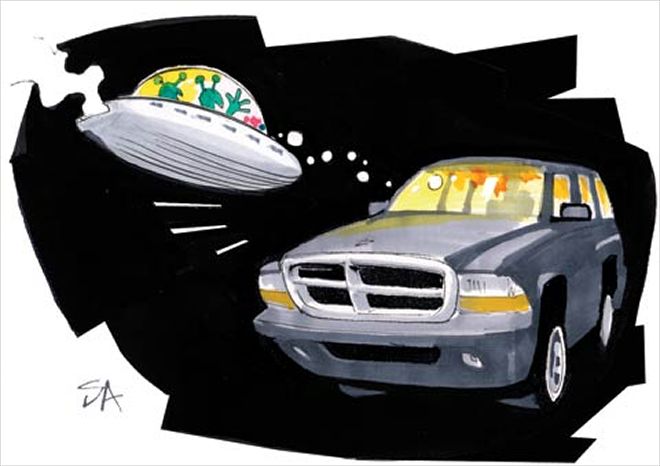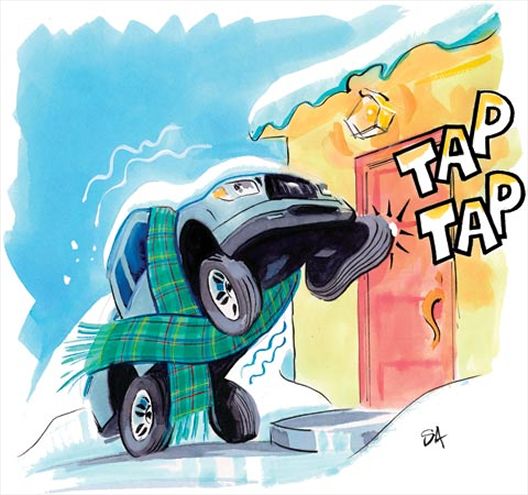What's the Octane?Q: I have a 2002 Sport Trac with 46,000 miles on it. Not long after I bought it used, a noticeable valve clatter began. It mainly happens when the engine's warm, under load, and the A/C is on. Once the heat of the day takes over, the clatter is almost continuous. The dealer says there's nothing he can do to remedy the noise and suggests using higher-octane gas and thicker motor oil.

| expert Advice
A: Higher-viscosity motor oil isn't the answer to valve clatter. Your description sounds more like a spark knock, which has always been a temperamental automotive complaint. The noise can be difficult to reproduce, occurring intermittently under specific temperatures, speeds, and load conditions. Adding to the equation, most automakers state that a slight spark knock or ping under light acceleration are normal characteristics of a low-emissions, fuel-efficient engine. Before switching to a higher octane rating, try the recommended fuel from a different company and station. Also be sure that the service department has updated the PCM with the most recent calibration. If the EGR system--which bleeds exhaust gas into the air/fuel mixture to reduce combustion temperature--isn't functioning as designed, that also can cause a spark knock. A worst-case scenario would be an internal condition such as excessive carbon buildup on top of a piston. Ask the dealership to be sure it's not a timing-chain-related noise. Some of Ford's 1999 to 2002 4.0 liter V 6 engines produce a rattling noise that sounds like a spark knock under acceleration between 2000 and 3000 rpm. A modified primary timing-chain tensioner kit corrects the problem. After that, get the vehicle to the dealership when the engine's hot and consistently producing the noise. Ask the service manager or next highest in command to drive the vehicle to confirm the condition.
Losing Your CoolQ: When I start my 5.7-liter, 1998 GMC Sierra 1500, the oil pressure goes up to 50 psi. After 10 minutes or so, when I come to a stop, it drops down to about 20 psi. Then the pressure returns to 50 psi while I'm driving. Is that normal? I also hear a slight ticking that doesn't sound like a valve. Could it be a lifter? The truck only has 84,000 miles on it. Also, my truck usually runs a 185- to 190-degree water temperature, but now it's running at 145-150 degrees. I recently replaced the water pump, thermostat, and hoses. Could I have done something wrong?
A: The oil pressure sounds perfectly normal. Pressure increases and decreases with engine speed and drops as the oil warms up and thins out. Minimum oil-pressure specifications at normal operating temperature are six psi at 1000 rpm, 18 at 2000, and 24 at 4000. Some 5.7 liters do make noise. There were issues with connecting-rod and main-crankshaft bearings causing knocks, with modified bearings recommended as a designated fix to adjust oil clearances. These engines also can produce a "tick" from a defective valve lifter. And there's a Technical Service Bulletin in effect (number 00-06-04-045) to correct a less-conventional cause of a ticking noise from the engine compartment. This one can sound like valvetrain noise or detonation and usually occurs when the engine's hot and under load. The cause is waves of exhaust pressure traveling by the air injector reactor (AIR) check valves and into the adjoining hose. The AIR system pumps air into the exhaust to help convert carbon monoxide into carbon dioxide and burn hydrocarbons (unburned fuel vapor). Three baffles can be installed in the AIR hose to reduce the noise. Finally, the thermostat should be maintaining the engine's coolant temperature between 188 and 206 degrees. If your coolant temperature has dropped out of range since replacing the thermostat, the new one may be defective, installed incorrectly, or something has affected the accuracy of the coolant-temperature gauge.
Avalanche of SoundQ: My 2002 Avalanche has 42,000 miles. The truck just developed an engine noise during cold starts. When starting the truck after it's been sitting for several hours, there's a lot of top-end noise. I have to let it warm up for a couple of minutes before it goes away. I'm using 5W 30 Mobil 1 oil.

| expert Advice
A: That's the correct viscosity for your truck, whether it's conventional, synthetic, or a synthetic blend. For an accurate diagnosis, have the engine noise evaluated at a Chevrolet service department. In the meantime, here are a couple of common situations to note: (1) Is a cold-start piston knock caused by normal carbon buildup on the pistons? This condition affects certain 1999-2002 4.8-, 5.3 , or 6.0 liter V-8 engines and, according to GM, doesn't impede engine performance or durability, so no repair is needed. This piston noise is a deeper tone, knocking from the lower part of the engine. (2) Could the noise from the top half be a tick or tap from a hydraulic valve lifter? Lifter noise on a 2002 5.3 liter V-8 can be caused by an oil-aeration condition, due to an oil-pump seal cut during assembly at the factory. TSBs apply to both conditions, but a plain-old valve-lifter failure also is on the list of possible causes.
Heat When You Need ItQ: I have a 2WD 2002 Isuzu Rodeo with the four-cylinder engine and 100,500 miles. In cold weather, I'll turn the temperature knob from cold to hot and get no heat. Then other times, I'll start the car and the heater works right away. The blower and the A/C seem to be fine. Any ideas?
A: Start by checking the engine's coolant level. It may be low from a coolant leak, which introduces air pockets into the system that can hamper engine cooling and heater performance. Also, take a look at the temperature gauge. A high or unstable reading is another indication of air in the system. A continually low coolant temperature indicates a thermostat that's stuck open, which will chill the engine and limit heater output. The temperature knob uses a cable to control a door that directs air through the heater core. A cracked or internally stripped knob, misadjusted cable, or binding doors are all possibilities. On occasion, there can be a blockage within the coolant system. You can check by confirming that the heater hoses, which enter and exit the heater core through the firewall, are hot to the touch while the engine is running. Hot in and cool out may indicate a clogged heater core or an obstruction elsewhere in the system.
Tapping from a TacomaQ: My 2001 4WD four-cylinder XtraCab Tacoma, which I bought new, now has 44,000 miles on the odometer. Each morning when it's cold out, I can hear a tapping noise, which didn't happen when it was new. The oil and filter have been changed every 3000 miles at the dealership. The service department said this noise is normal and nothing can be done about it.
A: My guess is that you're referring to a tapping or ticking sound from the valvetrain. Toyota's 2.7 liter four-cylinder engine uses a dual-overhead camshaft setup. I'm not aware of a cold-start noise being considered normal. But if that's the case, to prove its claim, the service department should be able to duplicate the noise for you with a similar vehicle and the same engine. The valve clearance is adjustable and is part of your recommended service schedule at 60,000 miles. If the noise is excessive, valve clearance should be the first thing checked. If the clearance at a particular valve is considerably outside of specifications, this may lead to the diagnosis of excessive wear of a valvetrain component.

| expert Advice
Electric Window DiagnosisQ: The electric window on the passenger side of my 2003 Chevy pickup quit working. Neither the passenger- nor driver-side switches will operate the window. How do I find the problem?
A: Odds lean toward a failed power-window motor, but you'll need to test it first. After removing the passenger-door trim panel, a technician can use a 12 volt test lamp to check for sufficient power (+) and ground (-) sources at the window motor itself. If power and ground circuits check out and there's nothing binding up the window tracks, consider the motor condemned and replace it immediately. If that's not the case, the problem circuit will have to be traced back through the switches, wiring, breakers, and so on. Again, an inoperative motor is the most common failure. Originally, the motor and window regulator (a simple transmission that links the motor to the window) had to be purchased together as a single part. But for a lot of 1999 to 2004 GM trucks, to lower expense and avoid unnecessary replacement of operable window regulators, the General Motors' parts department now distributes the window motors separately.
Hard-Shifting RamQ: I own a 1996 Dodge Ram 1500. When I initially accelerate, the transmission shifts fine through first and second gears, but sticks in third until 3500 rpm. It then shifts hard into overdrive. Also, when I initially purchased the vehicle (new), I ended up having to take it into the dealership several times for leaking transmission fluid. Several gasket changes later, they ended up finding out that the casing was porous and replaced the entire case. The Ram has 82,000 miles on it.
A: There's a wide array of potential causes of a late/hard upshift into fourth gear, ranging from software updates to a hydraulic valve hanging up in the transmission's valve body. Get your truck to a good transmission shop or the Dodge service department that replaced the transmission case under warranty. Transmission fluid leaks, or even a loss of engine oil or coolant, can be caused by a glitch in the original pour of molten metal during the manufacture of cast parts. Certain portions of the iron or aluminum casting may not have the metallic density to seal in fluids under certain pressures and temperatures. Should you be nervous about the transmission case being replaced on your brand-new Ram? I would be. When dealing with a major transmission failure on a new/low-mileage vehicle, the service department will often replace the entire transmission with a new or factory-remanufactured unit. If that was the situation, you're in good shape. But if the case was actually replaced by a dealership technician, you're relying solely on the individual's knowledge, skills, and expertise to provide long-term reliability of your transmission. The replacement of the c ase requires disassembly and reassembly of the entire transmission. Going 82,000 miles without a problem is a good sign.
How To Reach AlexIf you have a technical question regarding your pickup, SUV, or van, feel free to contact Alex, a master technician with the National Institute for Automotive Service Excellence. Send a letter to him in care of Truck Trend Garage, 831 S. Douglas Street, El Segundo, CA 90245, or e-mail us at
[email protected]. Please include the VIN with your question. Due to the volume of questions received every month, we cannot guarantee that everyone's question will be personally answered or will appear in the magazine.
Can't wait for help with a problem you're having with your Truck or SUV? Ask the expert we trust here at Truck Trend Garage--visit Alex Steele at www.RealWorldAutomotive.com.
 | expert Advice
A: Higher-viscosity motor oil isn't the answer to valve clatter. Your description sounds more like a spark knock, which has always been a temperamental automotive complaint. The noise can be difficult to reproduce, occurring intermittently under specific temperatures, speeds, and load conditions. Adding to the equation, most automakers state that a slight spark knock or ping under light acceleration are normal characteristics of a low-emissions, fuel-efficient engine. Before switching to a higher octane rating, try the recommended fuel from a different company and station. Also be sure that the service department has updated the PCM with the most recent calibration. If the EGR system--which bleeds exhaust gas into the air/fuel mixture to reduce combustion temperature--isn't functioning as designed, that also can cause a spark knock. A worst-case scenario would be an internal condition such as excessive carbon buildup on top of a piston. Ask the dealership to be sure it's not a timing-chain-related noise. Some of Ford's 1999 to 2002 4.0 liter V 6 engines produce a rattling noise that sounds like a spark knock under acceleration between 2000 and 3000 rpm. A modified primary timing-chain tensioner kit corrects the problem. After that, get the vehicle to the dealership when the engine's hot and consistently producing the noise. Ask the service manager or next highest in command to drive the vehicle to confirm the condition.
Losing Your Cool
| expert Advice
A: Higher-viscosity motor oil isn't the answer to valve clatter. Your description sounds more like a spark knock, which has always been a temperamental automotive complaint. The noise can be difficult to reproduce, occurring intermittently under specific temperatures, speeds, and load conditions. Adding to the equation, most automakers state that a slight spark knock or ping under light acceleration are normal characteristics of a low-emissions, fuel-efficient engine. Before switching to a higher octane rating, try the recommended fuel from a different company and station. Also be sure that the service department has updated the PCM with the most recent calibration. If the EGR system--which bleeds exhaust gas into the air/fuel mixture to reduce combustion temperature--isn't functioning as designed, that also can cause a spark knock. A worst-case scenario would be an internal condition such as excessive carbon buildup on top of a piston. Ask the dealership to be sure it's not a timing-chain-related noise. Some of Ford's 1999 to 2002 4.0 liter V 6 engines produce a rattling noise that sounds like a spark knock under acceleration between 2000 and 3000 rpm. A modified primary timing-chain tensioner kit corrects the problem. After that, get the vehicle to the dealership when the engine's hot and consistently producing the noise. Ask the service manager or next highest in command to drive the vehicle to confirm the condition.
Losing Your Cool | expert Advice
A: That's the correct viscosity for your truck, whether it's conventional, synthetic, or a synthetic blend. For an accurate diagnosis, have the engine noise evaluated at a Chevrolet service department. In the meantime, here are a couple of common situations to note: (1) Is a cold-start piston knock caused by normal carbon buildup on the pistons? This condition affects certain 1999-2002 4.8-, 5.3 , or 6.0 liter V-8 engines and, according to GM, doesn't impede engine performance or durability, so no repair is needed. This piston noise is a deeper tone, knocking from the lower part of the engine. (2) Could the noise from the top half be a tick or tap from a hydraulic valve lifter? Lifter noise on a 2002 5.3 liter V-8 can be caused by an oil-aeration condition, due to an oil-pump seal cut during assembly at the factory. TSBs apply to both conditions, but a plain-old valve-lifter failure also is on the list of possible causes.
Heat When You Need It
| expert Advice
A: That's the correct viscosity for your truck, whether it's conventional, synthetic, or a synthetic blend. For an accurate diagnosis, have the engine noise evaluated at a Chevrolet service department. In the meantime, here are a couple of common situations to note: (1) Is a cold-start piston knock caused by normal carbon buildup on the pistons? This condition affects certain 1999-2002 4.8-, 5.3 , or 6.0 liter V-8 engines and, according to GM, doesn't impede engine performance or durability, so no repair is needed. This piston noise is a deeper tone, knocking from the lower part of the engine. (2) Could the noise from the top half be a tick or tap from a hydraulic valve lifter? Lifter noise on a 2002 5.3 liter V-8 can be caused by an oil-aeration condition, due to an oil-pump seal cut during assembly at the factory. TSBs apply to both conditions, but a plain-old valve-lifter failure also is on the list of possible causes.
Heat When You Need It | expert Advice
Electric Window Diagnosis
| expert Advice
Electric Window Diagnosis